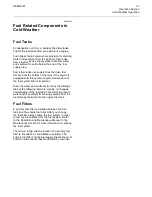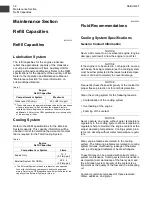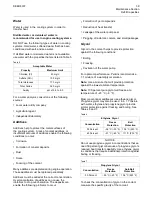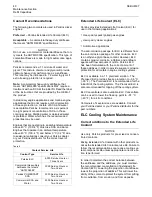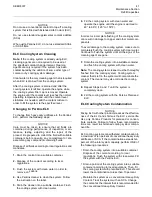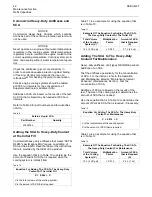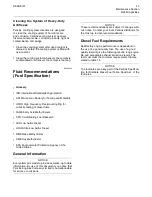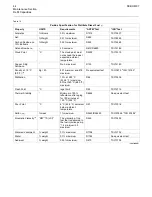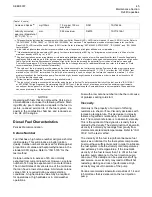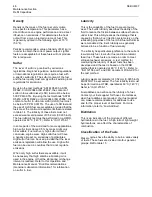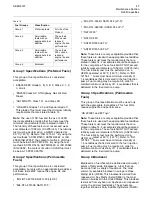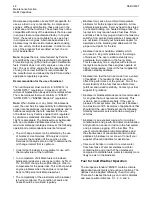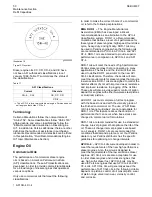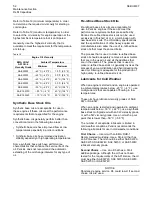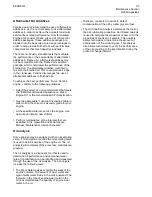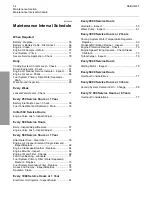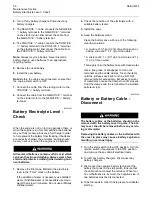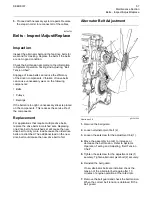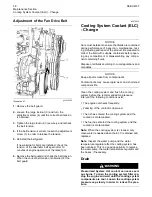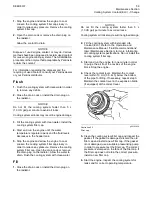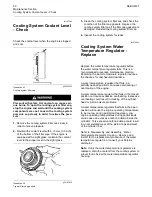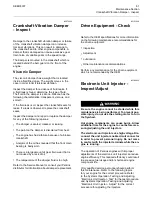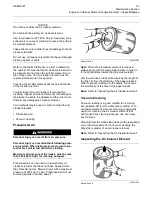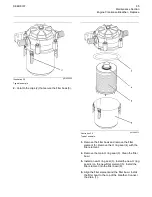
50
SEBU8337
Maintenance Section
Re
fi
ll Capacities
g00546535
Illustration 18
Typical API symbol
Diesel engine oils CC, CD, CD-2, and CE have
not been API authorized classi
fi
cations since 1
January 1996. Table 17 summarizes the status of
the classi
fi
cations.
Table 17
API Classi
fi
cations
Current
Obsolete
CH-4, , CI-4
CE, CC, CD
-
CD-2
(1)
(1)
The oil CD-2 is for a two-cycle diesel engine. Perkins does not
sell engines that utilize CD-2 oil.
Terminology
Certain abbreviations follow the nomenclature of
“SAE J754”. Some classi
fi
cations follow “SAE J183”
abbreviations, and some classi
fi
cations follow the
“EMA Recommended Guideline on Diesel Engine
Oil”. In addition to Perkins de
fi
nitions, there are other
de
fi
nitions that will be of assistance in purchasing
lubricants. Recommended oil viscosities can be found
in this publication, “Fluid Recommendations/Engine
Oil” topic (Maintenance Section).
Engine Oil
Commercial Oils
The performance of commercial diesel engine
oils is based on American Petroleum Institute
(API) classi
fi
cations. These API classi
fi
cations are
developed in order to provide commercial lubricants
for a broad range of diesel engines that operate at
various conditions.
Only use commercial oils that meet the following
classi
fi
cations:
•
API CH-4 CI-4
In order to make the correct choice of a commercial
oil, refer to the following explanations:
EMA DHD-1 –
The Engine Manufacturers
Association (EMA) has developed lubricant
recommendations as an alternative to the API oil
classi
fi
cation system. DHD-1 is a Recommended
Guideline that de
fi
nes a level of oil performance for
these types of diesel engines: high speed, four stroke
cycle, heavy-duty, and light duty. DHD-1 oils may
be used in Perkins engines when the following oils
are recommended: API CH-4, API CG-4, and API
CF-4. DHD-1 oils are intended to provide superior
performance in comparison to API CG-4 and API
CF-4.
DHD-1 oils will meet the needs of high performance
Perkins diesel engines that are operating in many
applications. The tests and the test limits that are
used to de
fi
ne DHD-1 are similar to the new API
CH-4 classi
fi
cation. Therefore, these oils will also
meet the requirements for diesel engines that require
low emissions. DHD-1 oils are designed to control the
harmful effects of soot with improved wear resistance
and improved resistance to plugging of the oil
fi
lter.
These oils will also provide superior control of piston
deposit for engines with either two-piece steel pistons
or aluminum pistons.
All DHD-1 oils must complete a full test program
with the base stock and with the viscosity grade of
the
fi
nished commercial oil. The use of “API Base
Oil Interchange Guidelines” are not appropriate for
DHD-1 oils. This feature reduces the variation in
performance that can occur when base stocks are
changed in commercial oil formulations.
DHD-1 oils are recommended for use in extended oil
change interval programs that optimize the life of the
oil. These oil change interval programs are based
on oil analysis. DHD-1 oils are recommended for
conditions that demand a premium oil. Your Perkins
dealer or your Perkins distributor has the speci
fi
c
guidelines for optimizing oil change intervals.
API CH-4 –
API CH-4 oils were developed in order to
meet the requirements of the new high performance
diesel engines. Also, the oil was designed to
meet the requirements of the low emissions diesel
engines. API CH-4 oils are also acceptable for use
in older diesel engines and in diesel engines that
use high sulfur diesel fuel. API CH-4 oils may be
used in Perkins engines that use API CG-4 and API
CF-4 oils. API CH-4 oils will generally exceed the
performance of API CG-4 oils in the following criteria:
deposits on pistons, control of oil consumption, wear
of piston rings, valve train wear, viscosity control,
and corrosion.


